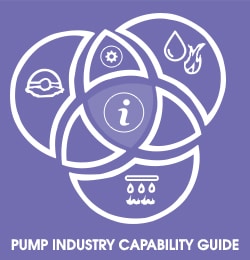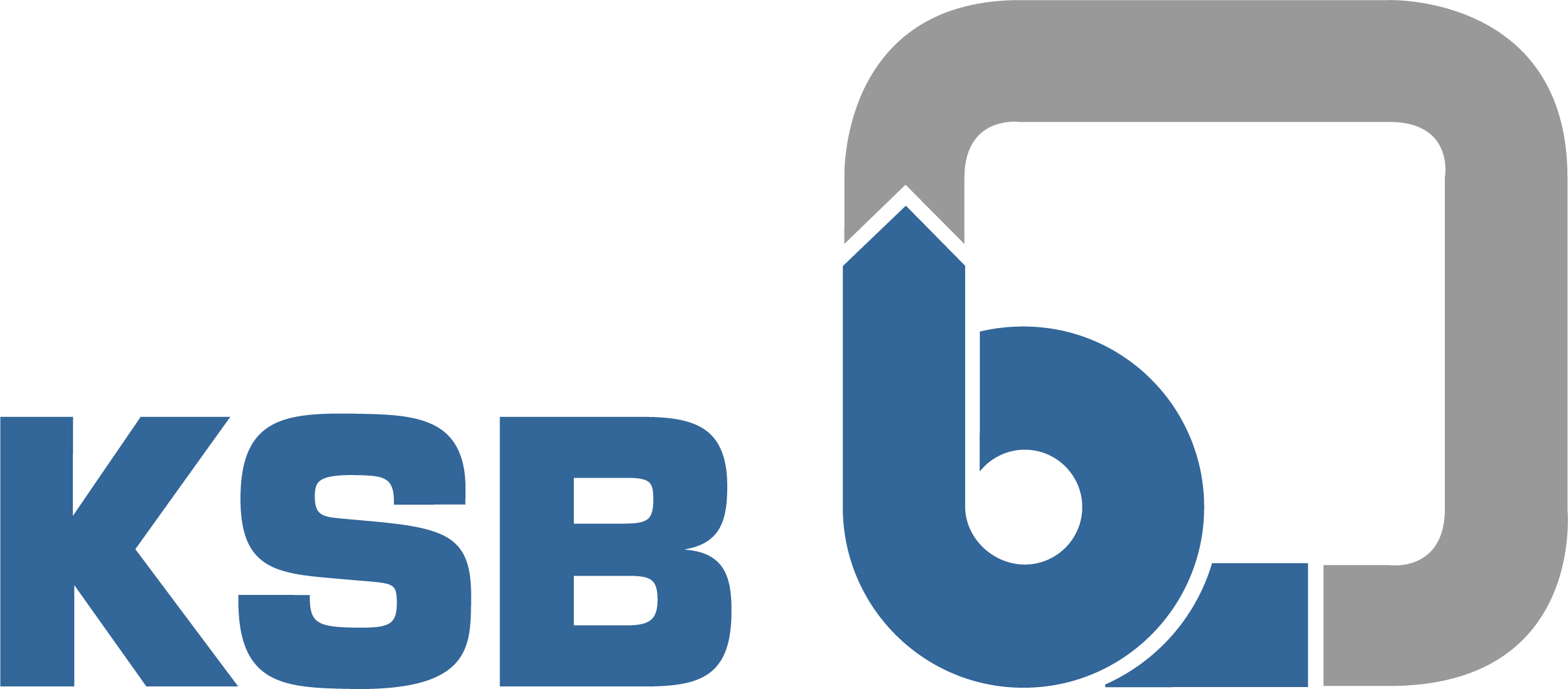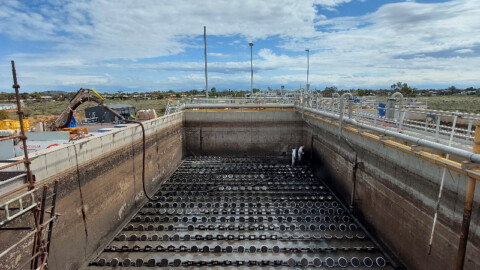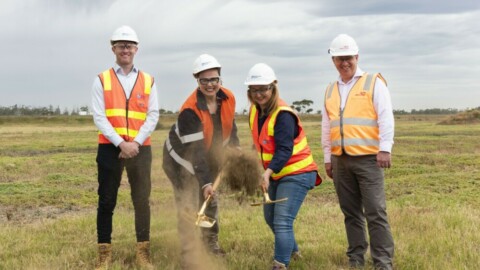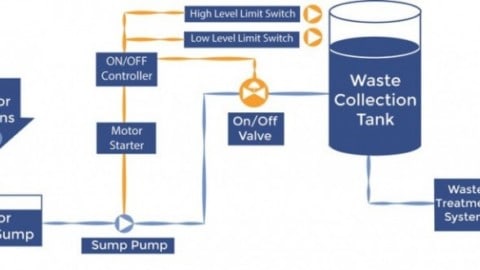Rapid urban growth in Melbourne’s west is forecast to produce significantly more recycled water over the coming decades. This presented a challenge to Greater Western Water to find more uses for the additional recycled water that would deliver community and environmental benefits. The Western Irrigation Network (WIN) was selected as the best option and has the additional benefit of increasing water security for farmers to the west, enabling them to improve productivity and expand agriculture in the region.
The $116.3 million WIN project consists of 59 kilometres of pipelines connecting the Sunbury, Melton and Bacchus Marsh recycled water treatment plants, and four large pump stations, along with three large water storages – each over 1GL – to provide storage over winter when irrigation demand is lower.
It is a major intergenerational and long-term project for the region, aimed at addressing how Greater Western Water can best manage the sewage volumes and excess recycled water produced by the growing population. Greater Western Water considered several solutions to the challenge, and ultimately selected WIN as it will produce the best outcome for its customers, the community, farmers, environment and local waterways, as well as for the utility itself.
As the populations in Sunbury, Bacchus Marsh and Melton grow, Greater Western Water will deliver excess recycled water suitable for
irrigation (Class C) through WIN to farmers in the Parwan-Balliang District. This district to the west of Melbourne is home to a number of dryland farms, where the area has rich fertile soil but limited and unreliable rainfall.
WIN will bring a reliable water supply to the region, transforming it into a climate resilient irrigation precinct, providing farmers with an opportunity for economic development and supporting Victoria’s food bowl. It will also address the challenge of sustainably managing increased amounts of wastewater from the growing population in Melbourne’s outer west.
It will initially supply 2.4 billion litres of recycled water annually from mid-2023, and by 2050, up to 18 billion litres will be available each year, with volumes increasing as irrigators adapt and expand production.

Project planning and hitting major milestones
Amanda Smith, General Manager Growth and Infrastructure at Greater Western Water, said planning for the project began in 2017 and involved significant stakeholder engagement, particularly with local agribusinesses in the Parwan-Balliang agricultural district.
“With the stakeholder needs understood, an operational model for the network was established to determine the most efficient way to
move recycled water to where it is needed most,” Ms Smith said.
“The model determined the optimal staging of the project to maximise the use of recycled water and flexibility to meet new demands as wastewater volumes grow in the future.
“This flexibility will allow new growers to join the network and foundation customers to expand their production systems, or to introduce new crops that require a higher volume of water.”
Construction began in late 2020 following the signing of a funding agreement between the Australian and Victorian Governments. The project
recently reached a major construction milestone with the completion of a new 1.1 billion litre storage dam at Greater Western Water’s Melton Recycled Water Plant.
Water is now flowing into the dam and will be delivered to farms from mid-2023, in time for the 2023/24 irrigation season. Construction has also commenced on the first pump station which will pump recycled water from the Melton Recycled Water Plant to the foundation customer farms via a long-distance pipeline. Works to construct the pipeline are due to commence later this year, with contracts recently awarded.

The pump stations
The network will include four new high-capacity pump stations, equipped with a total of 20 pump sets and variable speed drives. “A reference design and specifications were developed by our engineering partner, which included performance bands and control requirements for each of the pump stations,” Ms Smith said.
“This was followed by a two-phased procurement process that included an expression of interest and shortlisting process, followed by a request of tender phase for the design and construction of the pump stations.
“Greater Western Water is seeking long-lasting performance, so high reliability was a key factor. Submissions were therefore assessed
for total project cost over the life of the infrastructure. This approach provided us with the best opportunity to leverage the expertise of our delivery partners and challenged them to seek innovative solutions.”
Pump specifications
Ms Smith said the selection of pumping equipment considered energy efficiency, interchangeability where possible, high reliability and local support. “The four high-capacity transfer pump stations included in WIN will operate in series and have a wide flow range.
The range will vary from approximately 250 litres per second to 800 litres per second, ensuring the network can adapt to customer demands. To manage energy consumption, high-efficiency pumps were selected to transfer recycled water to farmers and allow irrigation to occur without re-pumping.” Ms Smith said.
“The varying WIN customer demands present a complex operational challenge. We’ve managed this by including balancing storage tanks ahead of each pump station to provide a hydraulic buffer, redundancy and improved system control.
“The transfer pump station and pipelines will be equipped with smart SCADA programming to ensure pumps are running at the best efficiency points. Pump performance is monitored by heat, vibration, pressure and flow sensors to identify premature wear conditions and energy wastage.”
Overcoming challenges
Ms Smith said delivering the project in a pandemic environment presented numerous challenges, including:
• Procurement of equipment and materials was impacted by international supply chain interruptions and border closures
• In-field investigations and foundation customer interactions were also impacted, especially with the project
spanning metro and regional areas
There are also learnings the utility is taking away from the project. “The planning approvals required for the long-distance pipelines have provided several learnings, particularly around cultural heritage and environment approvals,” Ms Smith said.
“As the project spans the Country of three Registered Aboriginal Parties, engagement with First Nations communities has presented opportunities to learn more about the Country we are working in and ways to work together for better cultural heritage outcomes.
“Thanks to this engagement, we have refined the project’s construction footprint and ran targeted ecological surveys to deliver better
environmental outcomes.”
Community and environmental benefits
The WIN project is a great example of a circular economy initiative that can deliver whole-of-community benefits for the region serviced by Greater Western Water. For farmers, it provides them with greater water security and the knowledge that there will be water available year-round to water crops, even if there is below-average rainfall.
By providing access to a guaranteed, cost-effective water supply, WIN will help existing agribusinesses expand, creating new jobs and contributing to local and state economies. WIN will also address the challenge of sustainably managing the increasing
volumes of wastewater caused by rapid population growth in Melbourne’s outer west.
As the population in this region increases, there is a need to find a use for all the extra recycled water produced. Excess recycled water is either stored for later use or released into waterways near Greater Western Water’s treatment plants under strict guidelines from Victoria’s Environment Protection Authority.
By greatly increasing the use of recycled water for irrigation, WIN will reduce the discharge of treated wastewater into local waterways, improving waterway health and protecting the environment.
By creating a new, sustainable recycled water supply, the project also future-proofs precious drinking water supplies across communities experiencing strong population growth and warmer, drier climate conditions.
“WIN is an exciting opportunity for the region and its success will rely on the strong partnership developed with the community enduring,” Ms Smith said. The project is jointly funded by the Federal Government, Greater Western Water and the private agribusinesses that will become WIN’s foundation customers.




